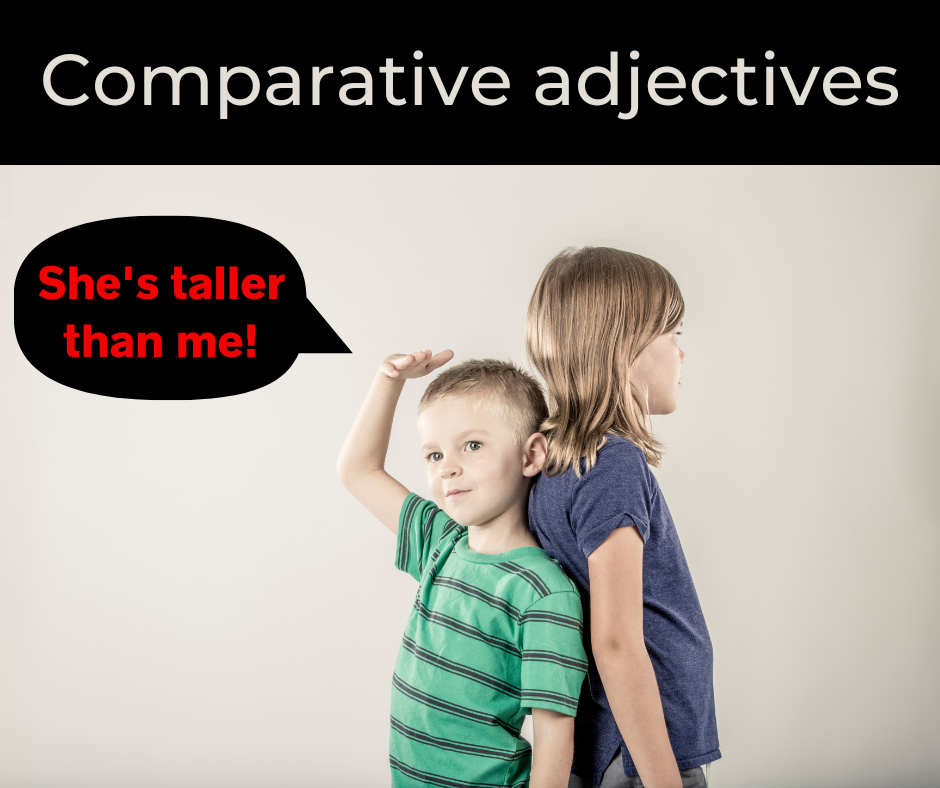
In this podcast, you’ll learn how to use comparative adjectives so that your English grammar will get better and better and better!
Voice message from Gastón
What are the criteria for the Cambridge B2 First exam?
The writing paper is difficult to prepare for without feedback from a teacher.
Download the Cambridge handbook for teachers. The links are here in this episode.
https://inglespodcast.com/ben (How to prepare for Cambridge exams with Ben from To The Point English)
Assessment scales and marking criteria for Cambridge B2, C1 and C2 exams with sample answers and commentary from Cambridge.
Free course on YouTube to prepare for the Cambridge B2 First exam: https://www.youtube.com/@LaMansionDelIngles

Improve your speaking fluency with Craig
https://www.englishmasterclass.net/
Comparative Adjectives
We use comparative adjectives to compare two people or things and explain the differences between them.
For example, Craig is older than Reza. He’s older, but not wiser! – notice we often use ‘than’ with comparatives.
We often add -er to adjectives when the word is short. For example, one or sometimes two syllables.
Valencia is hotter than London.
Belfast is wetter than Valencia.
Most cities in Spain are safer than cities in the UK.
If the adjective ends in ‘y’, this often changes to ‘i’.
Dry – drier
Valencia is drier than Manchester.
For adjectives ending in -y, even if they have two or more syllables, the comparative is -ier and NOT ‘more’ (although native speakers often break this rule)
For example, happy – happier, silly – sillier, cozy – cozier
If the adjective is longer, we usually use ‘more’. For example,
Grammar books are more expensive than this podcast.
Snowboarding is more dangerous than podcasting.
Is science fiction more interesting than history?
With some 2-syllable adjectives, we can use “-er” or “more”:
clever – cleverer/more clever
narrow – narrower/more narrow
simple – simpler/more simple
Past participle adjectives always use “more”, regardless of how many syllables:
more tired, more bored, more confused, more exaggerated
*The opposite of “more _” or “______er” is always “less ”, regardless of how many syllables.
Life in rural Costa Rica is less stressful than New York City.
Window cleaning is less skilled work than medicine.
Both Rob and Bill are rude, though Rob is less rude than Bill – so I prefer Rob.
There are a few adjectives that we use ‘more’ with, even though they only have one syllable. For example,
Fun – Snowboarding is more fun than golf.
(Don’t confuse with “funny” – This comedian is funnier than the one we saw yesterday.)
We can grade the difference between two things by adding an adverb:
Mexico City (22 million inhabitants) is much bigger than Valencia (around 1 million).
The language learner found German slightly easier to pronounce than Dutch – but they’re both difficult.
Craig is a bit/a little older than Reza, but not much.
For Europeans, the Chinese language is a lot harder to learn than English.
We hope your English becomes significantly/notably better after listening to our podcasts.
Discussion
Which is more difficult to learn, English or Spanish?
Are people today luckier than they were 50 years ago?
A very good smartphone or a very good internet connection – which is more useful?
Are you happier now or were you happier when you were younger?
What’s more important when choosing a place to live – climate or standard of living?
Would you prefer to be more handsome than you are now or more intelligent?
…and now it’s your turn to practise your English. What would you like to hear in future podcast episodes?
Send us a voice message. https://www.speakpipe.com/inglespodcast
Send us an email with a comment or question to [email protected] or [email protected]
This podcast is sponsored, in part, by mansionIngles.com. Visit the online store: https://store.mansioningles.net/
Thank you to all of you who are helping us by supporting this podcast on Patreon. Join our Patreon program for as little as $1.50 per month (+ VAT) and you get instant access to recent transcriptions. https://www.patreon.com/inglespodcast
Welcome to our new Patreon supporters who have joined us this month:
Chema De Lamo
Héctor Gómez Soria
Tomás
In next week’s episode: Superlative adjectives



